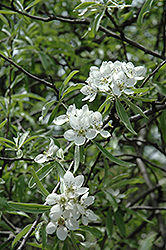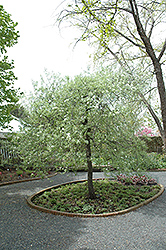It's all about ...
plants

Silver Frost Weeping Willowleaf Pear
Pyrus salicifolia 'Silver Frost'
Height: 15 feet
Spread: 15 feet
Sunlight:
![]()
Hardiness Zone: 5a
Description:
An attractive small tree with a gracefully weeping branching habit, features narrow foliage that emerges silver and matures to a silvery green; creamy white flowers in early spring; makes a great accent tree for smaller yards, allow it room to spread
Ornamental Features
Silver Frost Weeping Willowleaf Pear is blanketed in stunning clusters of creamy white flowers with purple anthers along the branches in mid spring, which emerge from distinctive pink flower buds. It has attractive gray deciduous foliage which emerges silver in spring. The fuzzy narrow leaves are highly ornamental but do not develop any appreciable fall colour. The fruits are showy green pomes displayed in mid fall. The fruit can be messy if allowed to drop on the lawn or walkways, and may require occasional clean-up.
Landscape Attributes
Silver Frost Weeping Willowleaf Pear is a deciduous tree with a rounded form and gracefully weeping branches. Its relatively fine texture sets it apart from other landscape plants with less refined foliage.
This is a high maintenance tree that will require regular care and upkeep, and is best pruned in late winter once the threat of extreme cold has passed. Gardeners should be aware of the following characteristic(s) that may warrant special consideration;
- Messy
- Disease
Silver Frost Weeping Willowleaf Pear is recommended for the following landscape applications;
- Accent
Planting & Growing
Silver Frost Weeping Willowleaf Pear will grow to be about 15 feet tall at maturity, with a spread of 15 feet. It has a low canopy with a typical clearance of 1 foot from the ground, and is suitable for planting under power lines. It grows at a medium rate, and under ideal conditions can be expected to live for 50 years or more.
This tree should only be grown in full sunlight. It does best in average to evenly moist conditions, but will not tolerate standing water. It is not particular as to soil type or pH. It is highly tolerant of urban pollution and will even thrive in inner city environments. This is a selected variety of a species not originally from North America.
This plant is not reliably hardy in our region, and certain restrictions may apply; contact the store for more information.

